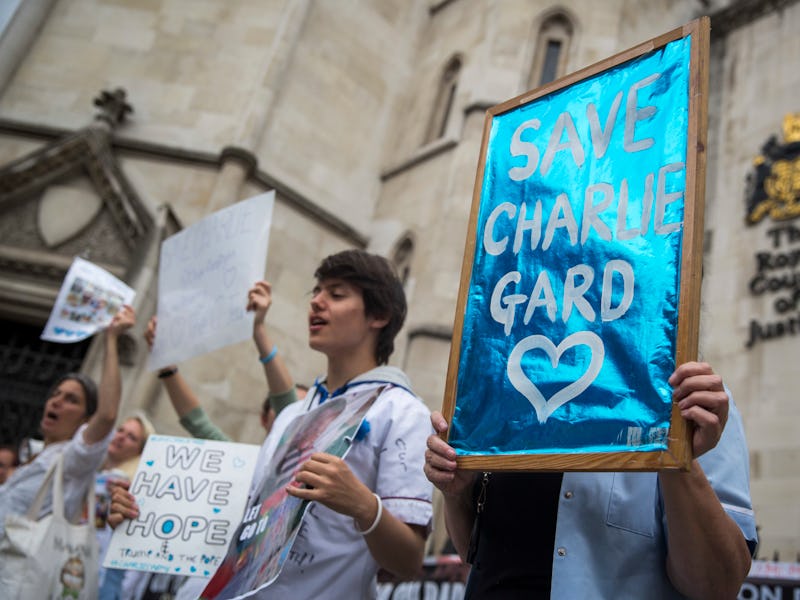3 Reasons Charlie Gard Became a Powerful Political Symbol
The baby's life was the focus of a massive legal battle.

The battle over the life of Charlie Gard, the nearly year-old infant with a rare and debilitating genetic disease who died on Friday, thrust many ethical questions onto front pages and social media feeds. The efforts of Charlie’s parents, Connie Yates and Chris Gard, to acquire control of their child’s fate from Great Ormond Street Hospital in central London where he was being treated, transitioned into a court battle that pitted parental guardianship against medical experts and more.
A Republican Paradox
The Gard case made waves in the United States for a number of reasons; one being Republican congress members’ effort to grant U.S. citizenship to the child to receive care. Republicans jumped in to support the family’s request to send the infant to the U.S. for an experimental treatment, for which the couple had raised $1.7 million to make happen.
Even President Donald Trump weighed in, tweeting on July 3, “If we can help little #CharlieGard, as per our friends in the U.K. and the Pope, we would be delighted to do so.”
On July 18, the House Committee on Appropriations voted unanimously to approve an amendment granting permanent residency to Charlie. “Parents have the most at stake when it comes to standing up for their children and right now, we have an incredible opportunity to stand with a family and save a child’s life,” Rep. Jaime Herrera Beutler said in a statement.
However, Great Ormond Street Hospital and independent medical experts had maintained that sending Charlie to the U.S. would only prolong his suffering, and do nothing for his condition. The doctor whose experimental treatment Charlie’s parents had hoped would change his condition, Michio Hirano, a neurologist at Columbia University, also confirmed upon examining Charlie later in July that he had suffered muscular atrophy and that the treatment — which had never been specifically tested on a child with Charlie’s genetic disease — would prove futile.
Republican support of Charlie Gard was loaded from the get-go. Supporting the possibility of treating a child with a rare and dangerous disease, while commendable, came at a time when most of the Republican party was attempting to strip Americans of the health care they had received under the Affordable Care Act.
Whether intentional or not, the support for Charlie Gard could also appear undermine the UK’s nationalized health care system, encouraging the idea that individual care is more effective, and that if a family raises enough money, innovative and new treatments can be provided in the U.S.
Chris Gard and Connie Yates, the parents of Charlie Gard.
Parental Rights
Something touched upon in Beutler’s statement is another theme that was prominent in the Charlie Gard case: the rights of parents to control the fate of a child.
Great Ormond Street Hospital’s wish to take the child off life support resulted in an emotional and very public legal battle between Charlie’s parents and the healthcare apparatus of the state. The parents took the case to Britain’s Supreme Court after a series of judges supported Great Ormond Street’s decision that Charlie should be allowed to die. Great Ormond Street had successfully argued that Charlie had suffered catastrophic and irreversible brain damage — he could not could not see, hear, cry, or swallow, and he needed a ventilator to breathe — and that the best course of action was to take him off life support in a hospice setting.
However, the possibility of an experimental treatment to save Charlie’s life kept his parents in the courts. The case bitterly divided UK residents, some of which sided with the family’s wishes to try anything and everything, while others believed it was naive not to trust the opinions of medical experts.
The Pro Life Argument
This leads to a final social issue that was enflamed by Charlie Gard’s condition: the right to life. Pro-life groups quickly took up the campaign for Charlie Gard’s right to live — as opposed to what doctor’s may have argued was Charlie Gard’s right to die. In early July, the director of the Christian Defence Coalition, Reverend Patrick Mahoney, flew from the U.S. to the UK to act as a self-appointed representative of the family. According to The Guardian, Mahoney has a history of using extreme tactics to promote his pro life agenda:
In 1992 he was sentenced to six months in jail with three others for breaching a restraining order prohibiting them from demonstrating in front of abortion clinics in Texas. He is also a founding board member of the US anti-abortion healthcare provider Stanton Healthcare, which helps women with “challenging pregnancies”, including encouraging rape victims to give birth.
Despite the conflicting narratives surrounding Charlie Gard, in the end, Great Ormond Street Hospital’s wishes prevailed over the parents. Charlie died in a hospice on Friday after having his life support systems withdrawn.